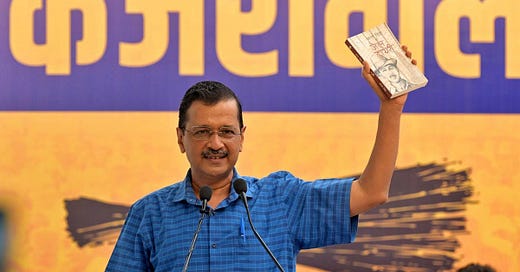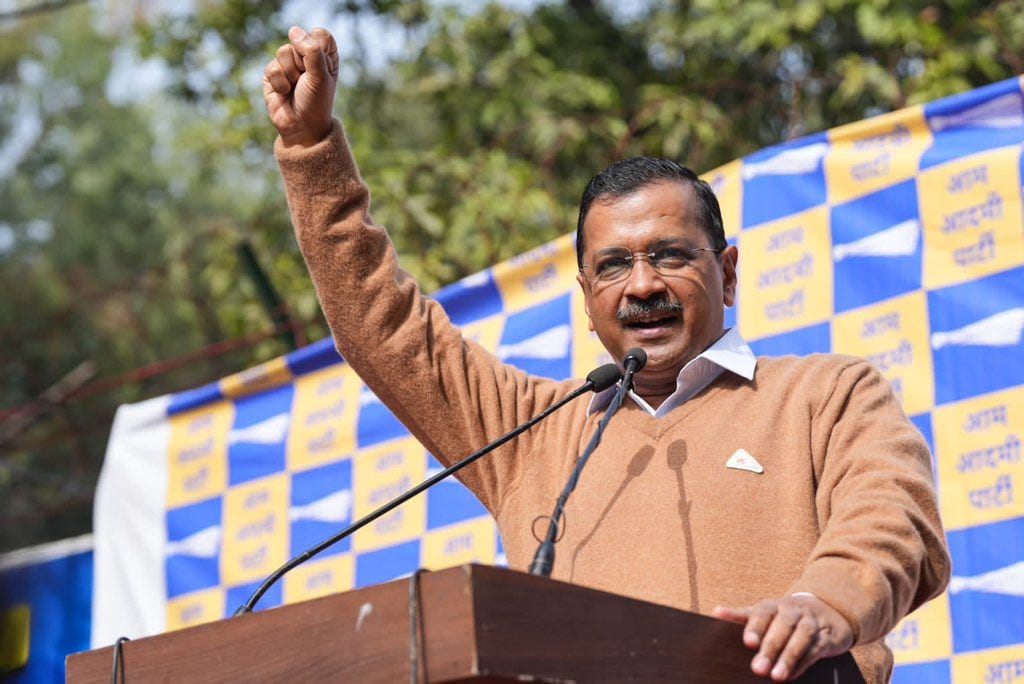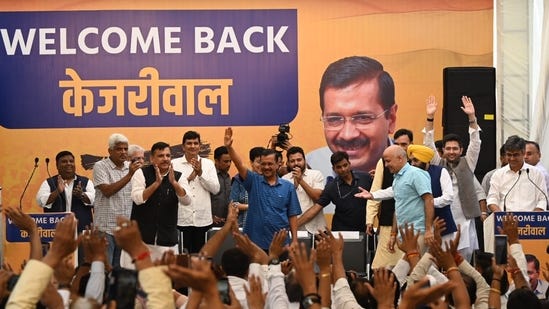Kejriwal to Resign as Delhi CM in Two Days—A 10-Pronged Political Masterstroke
Takes the Wind Out of BJP’s Publicity and Propaganda While Seizing the High Moral Ground.
Surprise Announcement: Kejriwal to Resign as Delhi CM in Two Days
In a surprising yet calculated political move, Delhi Chief Minister Arvind Kejriwal has announced his decision to resign from his post in the next two days. "Some people say that we will not be able to work because of restrictions imposed by the Supreme Court. Even they did not leave any stone unturned in imposing restrictions on us... If you think I am honest, vote for me in large numbers. I will sit on the CM's chair only after being elected," Kejriwal said, as reported by ANI. He further demanded that the Delhi elections, originally set for February 2025, be advanced to November 2024, aligning with Maharashtra's state elections. Until then, another party member will temporarily assume the Chief Minister's office.
This unexpected resignation announcement, though sudden, is a carefully considered and a brilliantly orchestrated political manoeuvre aimed at achieving several objectives simultaneously. Let’s explore the 10 prongs of this masterstroke:
1. Defeating the BJP's Plot
Kejriwal’s decision to not resign while in jail was a strategic move to thwart the BJP's alleged conspiracy to have him removed from office through incarceration. He repeatedly emphasised that the Supreme Court had questioned the legality of forcing a Chief Minister to resign merely because they were in judicial custody without conviction or prounced as guilty of an offence. By refusing to step down then, Kejriwal turned the tables on his political adversaries, denying them a premature victory.
2. A Fresh Mandate—A Higher Moral Ground
Now that he is out on bail, Kejriwal seeks a fresh mandate from the people of Delhi. This bold gesture sends a clear message that he is not clinging to power for personal gain. Instead, he positions himself as a humble servant of the people, ready to relinquish the Chief Minister's chair until the electorate renews their faith in him. By doing so, he casts himself as a selfless leader committed to democratic principles, willing to step down until he has the people's approval to return.
3. Advancing Delhi Elections
Kejriwal’s call for advancing the Delhi Vidhan Sabha elections to November 2024, alongside Maharashtra’s elections, serves to demonstrate his political courage. By pushing for early elections, Kejriwal sends a message that he has no fear of facing the electorate, contrasting his stance with that of the BJP, which has previously been accused of manipulating election schedules for political gain. This move puts the ruling party at the centre on the back foot, forcing them to either concede to early elections or risk being perceived as avoiding a popular mandate and elections in Delhi.
4. The Election Commission Dilemma
Should the Election Commission reject his call for early polls, Kejriwal and AAP will have a powerful narrative to sell: that the BJP is afraid of the electorate in the National Capital Territory. By framing the ruling party as hesitant to face the people, Kejriwal shifts public perception, turning an administrative decision into a potential electoral advantage. In any case, the optics of Kejriwal pushing for early elections only strengthens his image as a confident, people-first leader.
5. The Full-Powered Successor
The next Chief Minister appointed by the AAP's legislative party will not merely be a caretaker or interim figure but will have full powers to govern, unlike in the scenario when the Vidhan Sabha has been dissolved. This ensures that Kejriwal's decision to step down does not create a leadership vacuum or a lame duck CM. Instead, the new Chief Minister will continue to execute the government's agenda with authority, as permissible under the Constitution and the ancillary laws, giving AAP the stability and continuity it needs to remain efficient as well as effective. Kejriwal’s strategic withdrawal hands over governance to a loyalist without diminishing the party's functioning.
6. Transparent Leadership Selection
In keeping with his commitment to transparency, Kejriwal is likely to distance himself from the selection of his successor. By allowing the AAP legislative party to elect a new leader without his direct involvement, Kejriwal may ensure that no allegations of nepotism or undue influence can arise. This democratic process reinforces his image as a leader committed to fair play, even within his own party.
7. Sidestepping Bail Constraints
As Chief Minister, Kejriwal was significantly restricted by the terms of his bail, which limited his ability to visit the Delhi Secretariat and perform essential functions. By stepping down, he frees himself from these constraints and enables a fully functioning government to take over. The decision removes the spectre of a "lame-duck" administration and allows his successor to govern without hindrance, albeit under his informal guidance, subject, of course, to the constitutional and statutory limitations.
8. Focusing on Haryana Elections
Freed from his duties as Chief Minister, Kejriwal will now be able to dedicate his full attention to the upcoming Haryana elections. His absence during the alliance negotiations with Congress has already impacted AAP’s strategy in the state. However, with the last date for withdrawal of nominations approaching tomorrow, 16th September, Kejriwal’s full focus on Haryana might still salvage a last-minute electoral pact or boost AAP’s campaign efforts in his original home state.
9. National Expansion Strategy
Kejriwal’s resignation from the Delhi Chief Minister's post also allows him to focus on expanding AAP’s national footprint. With the Maharashtra elections on the horizon, he can concentrate on growing the party’s presence in key constituencies, potentially planting the seeds for future political influence in the state. This calculated shift in focus can significantly impact AAP’s long-term growth outside Delhi and Punjab.
10. Strengthening AAP in Punjab and Legal Battles
Kejriwal’s resignation allows him to focus on fortifying AAP’s governance in Punjab, state under severe fiscal stress, where his party enjoys a massive majority. At the same time, he will have more bandwidth to address the legal challenges that both he and his colleagues face. His ability to take charge of AAP’s legal strategy, particularly in the cases against former minister Satyendar Jain, could prove crucial in clearing the party’s name and maintaining its credibility.
A Well-Timed Move
The BJP, unsurprisingly, has criticised Kejriwal's decision, calling it a “virtue made out of necessity.” However, the timing of his resignation has effectively neutralised the BJP’s strategy to portray him as a “corrupt leader” desperate to hold on to power. By stepping down voluntarily, Kejriwal has removed one of the BJP's main talking points ahead of the elections, forcing them to recalibrate their campaign messaging.
The Next CM—A Calculated Risk?
While speculation is rife regarding Kejriwal’s successor, one possibility that cannot be ruled out is the election of his wife, Sunita Kejriwal, as the next Chief Minister. If such a move were to happen, Kejriwal could argue that the choice was a unanimous decision of the AAP legislative party, avoiding accusations of nepotism. Such a move, while controversial, could solidify his hold on Delhi politics while maintaining the veneer of internal party democracy. However, whether this will happen or not, only time will tell.
Kejriwal’s Political Genius
Arvind Kejriwal’s decision to resign is far from political theatre; it is a calculated masterstroke that addresses multiple challenges while simultaneously fortifying his party’s standing, both in Delhi and nationally. By stepping down, he has cleverly paved the way for a fresh mandate from the people, positioning himself for a return with renewed vigour and legitimacy. Whether one admires or criticises him, Kejriwal's influence on Indian politics is undeniable. This latest move further solidifies his status as one of the most astute political minds in the country and the undisputed leader of AAP—the youngest "startup" to attain the status of a national party in record time. His sharp media management and succinct, impactful messaging afford him outsized influence, not only in opposition unity but also in print, electronic, and social media narratives, often outmanoeuvring larger, more established political forces.
As Kejriwal steps into a new phase of political leadership, one thing is certain: Indian politics is about to witness more intriguing and unpredictable days ahead.








ਦਿਵਸੁ ਰਾਤ ਦੁਇ ਦਾਈ ਦਾਇਆ ਖੇਲੈ ਸਗਲ ਜਗਤੁ